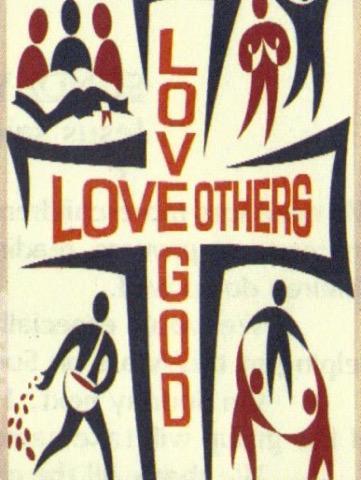Now we have to shape what some have started calling; The Church at Home. Although I keep asking myself; What do those who do not have a home do? For this reason, at the same time, I am declaring today in our Holyrood Church a Lenten day of prayer, fasting and reading the Bible in the Time of the Coronavirus.
In Jesus, love of God and love of neighbor have their own context, their ultimate solidity

Good morning, happy Friday, and many blessings.
In today’s gospel (Matthew 22:34-40) Jesus is in Jerusalem and precisely in the Temple where a process between Him and His adversaries is taking place, the chief priests and the scribes, between the chief priests and the elders of the people and between the chief priests and the Pharisees. The point of controversy of the debate is: the identity of Jesus or of the Son of David, the origin of His identity, and, therefore, the question regarding the nature of the Kingdom of God. The evangelist presents this plot of debates with a sequence of controversies that present a growing rhythm: the tribute to be paid to Caesar, the resurrection of the dead, the greatest commandment, the Messiah, son and Lord of David. The protagonists of the first three discussions are representatives of the official Judaism who try to place Jesus in difficulty on some crucial questions. These disputes are addressed to Jesus in so far as He is “Master” (Rabbi). This title tells the reader of the understanding that the interlocutors have of Jesus, but Jesus takes this occasion to lead them to ask themselves a more crucial question: the last time they took position concerning His identity.
On the trail of the Sadducees who have preceded, the Pharisees ask Jesus a burning question: which is the greatest commandment? The Rabbis first make evident the multiplicity of the prescriptions (248 commandments), then the question is asked of Jesus regarding which is the most important. Just the same, the Rabbis themselves had created a true survey to reduce them as far as possible: David lists eleven (Ps 15:2-5), Isaiah six (Isa 33:15), Micah three (Mic 6:8), Amos two (Am 5:4) and Habakkuk only one (Hab 2:4). But the intention of the Pharisees regarding their question goes beyond every type of survey; it is a question of the essence itself of the prescriptions.
Jesus, in answering, binds together love of God and love of neighbor, so much so as to unite them in only one, but without refusing to give priority to the first one, which subordinates, in a close way, the second one. Thus, all the prescriptions of the Law, all 613, are placed in relationship with this unique commandment: the whole Law finds its significance and foundation in the one of love. Jesus carries out a process of simplification of all the precepts of the law: anyone who puts into practice the only commandment of love does not only observe the law, but also the prophets.
Just the same, the novelty of the response is not so much the material content as in its realization: in Jesus, the love of God and love of neighbor have their own context, their last solidity. That is to say, that God’s love and love of neighbor, shown and realized in some way in his person, guides people to place themselves before God and before others through love. The only commandment in two, God’s love and love for neighbor, become the supporting column, not only of the scriptures, but also of the life of the Christian.
I want to leave you with this question: Is love for God and for neighbor only a vague sentiment, an emotion, a passing motion or a reality that affirms your whole person: heart, will, intelligence and human relationships?
Blessings
Fr. Luis+
- Log in to post comments
